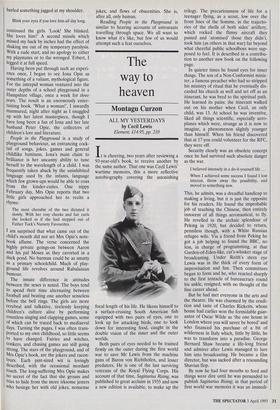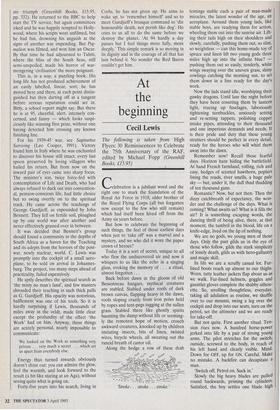The way to heaven
Montagu Curzon
ALL MY YESTERDAYS by Cecil Lewis Element, f14.95, pp. 210 It is cheering, two years after reviewing a 93-year-old's book, to receive another by the same author. That one was Cecil Lewis' wartime memoirs, this a more reflective autobiography covering the astonishing focal length of his life. He likens himself to a surface-cruising South American fish equipped with two pairs of eyes, one to look up for attacking birds, one to look down for interesting food, caught in the double vision of the inner and the outer worlds.
Both pairs of eyes needed to be trained firmly on the outer during the first world war to save Mr Lewis from the machine guns of Baron von Richthofen, and lesser predators. He is one of the last surviving veterans of the Royal Flying Corps. His account of that time, Sagittarius Rising, was published to great acclaim in 1935 and now a new edition is available, to make up the trilogy. The precariousness of life for a teenager flying, as a scout, low over the front lines of the Somme, in the trajecto- ries of the shells of both sides' artillery, which rocked the flimsy aircraft they passed and 'atomised' those they didn't, took him (as others in that war) far beyond what cheerful public schoolboys were sup- posed to feel. It is described in a contribu- tion to another new book on the following page.
In quieter times he found eyes for inner things. The son of a Non-Conformist minis- ter, a famous preacher who had so stripped his ministry of ritual that he eventually dis- carded his church as well and set off as an itinerant, he was bred to the spiritual path. He learned its pains: the itinerant walked out on his mother when Cecil, an only child, was 13. At school he was inventive, liked all things scientific, especially aero- planes which were, strange as it is now to imagine, a phenomenon slightly younger than himself. When his friend discovered that at 17 you could volunteer for the RFC, they were off.
Security clearly was an obsolete concept once he had survived such absolute danger as the war.
I believed intensely in a do-it-yourself life ...
When I achieved some success I found I lost interest, threw away the possibility, and moved to something new.
This, he admits, was a dreadful handicap to making a living, but it is just the opposite for his readers. He found the improbable job of teaching the Chinese, then entirely innocent of all things aeronautical, to fly. He revelled in the archaic splendour of Peking in 1920, but decided to return, penniless though, with a White Russian refugee wife. Via a friend from Peking he got a job helping to found the BBC, no less, in charge of programming, at that Garden-of-Eden-like, cat's-whisker stage of broadcasting. Under Reith's stern eye Lewis was in the thick of every form of improvisation and fun. Then committees began to form and he, who reacted sharply to the first tentacle of bureaucracy round his ankle, resigned, with no thought of the fine career ahead.
But he had met everyone in the arts and the theatre. He was charmed by the erudi- tion and taste of Charles Ricketts, whose house had earlier won the formidable guar- antee of Oscar Wilde as 'the one house in London where you will never be bored' and who financed his purchase of a bit of wilderness in Italy which, little by little, he was to transform into a paradise. George Bernard Shaw became a life-long friend and admirer after Lewis managed to lure him into broadcasting. He became a film director, but was sacked after a resounding Shavian flop.
By now he had four mouths to feed and things were dire until he was persuaded to publish Sagittarius Rising; in that period of first world war memoirs it was an immedi- ate triumph (Greenhill Books, £15.95, pp. 332). He returned to the BBC to help start the TV service, but again committees irked and he was happily tempted to Holly- wood, where his scripts went unfilmed, but he had fun, drowning his anguish at the signs of another war impending. But Pyg- malion was filmed, and won him an Oscar. By that time he had adjourned to Tahiti, where the bliss of the South Seas, still semi-unspoiled, made his horror of war- mongering 'civilisation' the more poignant.
This is, in a way, a puzzling book. His long life has not produced achievement of an easily labelled, linear, sort; he has moved here and there, at each point distin- guished but then darting off at a tangent before serious reputation could set in. Bitty, a school report might say. But there he is at 95, cheerful, alert, intensely con- cerned, and funny — which looks suspi- ciously like winning first prize, without one having detected him crossing any known finishing line.
For his 1939-45 war, see Sagittarius Surviving (Leo Cooper, 1991). Victory found him in Italy where he was enchanted to discover his house still intact, every last spoon preserved by loving villagers who hailed his return. But from now on the inward pair of eyes came into sharp focus. The minister's son, twice force-fed with contemplation of Life and Death, who had always refused to duck out into convention- al, pension-conscious life, had little choice but to swing overtly on to the spiritual track. He came across the teachings of George Gurdjieff, as expounded by John Bennett. They fell on fertile soil, ploughed up by one world war after another and never effectively grassed over in between.
It was decided that Bennett's group should found a community in the depths of South Africa as a haven for the Teaching and its adepts from the horrors of the post- war, newly nuclear, world. C. Lewis was promptly into the cockpit of a small aero- plane, to be sold on arrival in Johannes- burg. The project, too many steps ahead of practicality, failed expensively.
He aptly describes the spiritual search as `the misty no man's land', and few masters shrouded their teaching in such thick palls as G. Gurdjieff. His opacity was notorious, bafflement was one of his tools. So it is hardly surprising if Lewis, thousands of miles away in the veldt, made little clear except the profundity of the effect 'the Work' had on him. Anyway, these things are acutely personal, nearly impossible to communicate:
We looked on the Work as something very private . . . very much a secret . which set us apart from everybody else.
Energy thus turned inwards obviously doesn't shine out: you can admire the glow, feel the warmth, and look forward to the result (a bit like staring at an Aga), without seeing quite what is going on.
Forty-five years into his search, living in Corfu, he has not given up. He aims to wake up, to 'remember himself and so to meet Gurdjieffs brusque command to 'die honourable death, not perish like dog'. He cries to us all to do the same before we destroy the planet. 'At 94 hardly a day passes but I feel things more fully, more deeply.' This simple remark is so moving in its dignity and in the courage of all that has lain behind it. No wonder the Red Baron couldn't get him.



















































 Previous page
Previous page